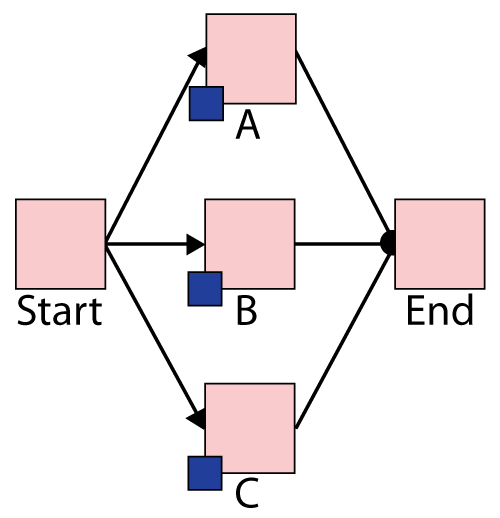Template:Rotation: Difference between revisions
Dingzhou Cao (talk | contribs) |
Dingzhou Cao (talk | contribs) |
||
| Line 4: | Line 4: | ||
Three devices A, B and C are in parallel and rotate to perform the task. A is ON initially, B and C are standby. When A fails, Turn B On; when B fails, turn C ON and when C fails, Turn A ON. The desired situation is that, at every moment, one and only one device is operating. This means that, when a device is done with repair, it should be standby if there is already one device operating; or it should be operating when there is not device operating. | Three devices A, B and C are in parallel and rotate to perform the task. A is ON initially, B and C are standby. When A fails, Turn B On; when B fails, turn C ON and when C fails, Turn A ON. The desired situation is that, at every moment, one and only one device is operating. This means that, when a device is done with repair, it should be standby if there is already one device operating; or it should be operating when there is not device operating. | ||
==== BlockSim Solution ==== | ==== BlockSim Solution ==== | ||
The Blocksim | The Blocksim modeling of this system is shown in Figure below. | ||
[[File:Blocksim Example Rotation example.png]] | [[File:Blocksim Example Rotation example.png]] | ||
The failures of all three blocks follow Weibull distribution with Beta = 1.5 and Eta = 1000. The repair durations of three blocks follow Weibull distribution with Beta = 1.5 and Eta = 100. After repair, they are as good as new. Based on item's age, there are inspections for the three block every 500 hours, and the duration of inspection has the same distribution and parameters with repair duration. After inspection, the block is the same as it was when it failed. | |||
[[Category:BlockSim_Examples]] | [[Category:BlockSim_Examples]] | ||
Revision as of 21:01, 20 July 2011
Rotation Example
Description
Three devices A, B and C are in parallel and rotate to perform the task. A is ON initially, B and C are standby. When A fails, Turn B On; when B fails, turn C ON and when C fails, Turn A ON. The desired situation is that, at every moment, one and only one device is operating. This means that, when a device is done with repair, it should be standby if there is already one device operating; or it should be operating when there is not device operating.
BlockSim Solution
The Blocksim modeling of this system is shown in Figure below.
 The failures of all three blocks follow Weibull distribution with Beta = 1.5 and Eta = 1000. The repair durations of three blocks follow Weibull distribution with Beta = 1.5 and Eta = 100. After repair, they are as good as new. Based on item's age, there are inspections for the three block every 500 hours, and the duration of inspection has the same distribution and parameters with repair duration. After inspection, the block is the same as it was when it failed.
The failures of all three blocks follow Weibull distribution with Beta = 1.5 and Eta = 1000. The repair durations of three blocks follow Weibull distribution with Beta = 1.5 and Eta = 100. After repair, they are as good as new. Based on item's age, there are inspections for the three block every 500 hours, and the duration of inspection has the same distribution and parameters with repair duration. After inspection, the block is the same as it was when it failed.